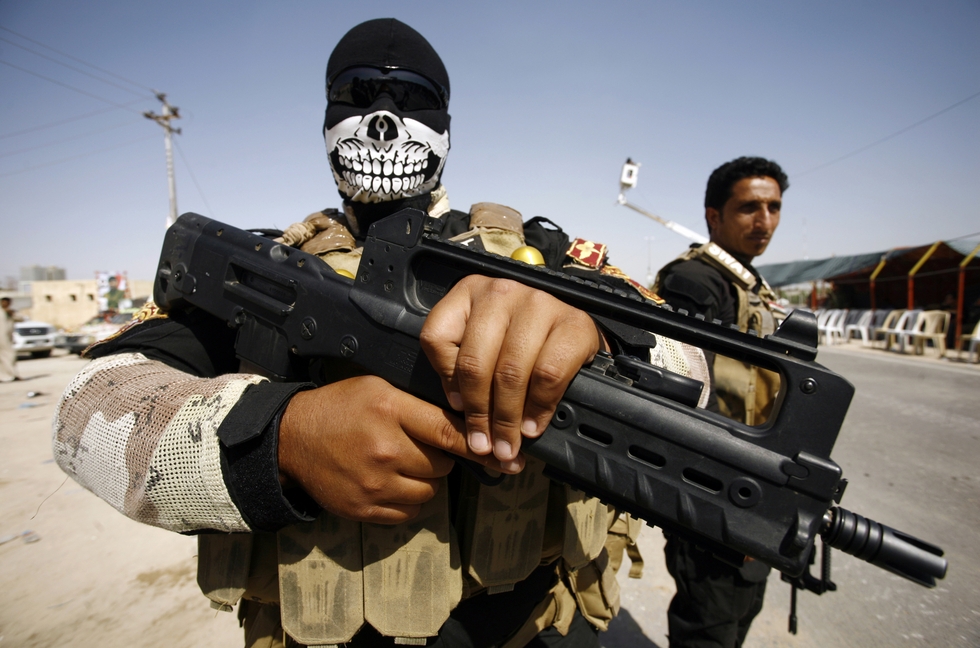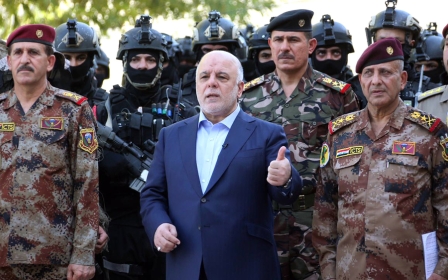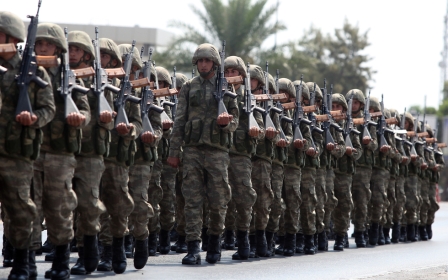Iraqi forces threaten to attack Turkish troops as Mosul battle looms

Turkish military forces deployed in northern Iraq for a year may be attacked by the Iraqi army if they intervene in the battle to liberate Islamic State-held Mosul, Iraqi officials and commanders of Shia militias told Middle East Eye.
Turkey has deployed hundreds of troops armed with heavy weaponry to the Iraqi town of Bashiqa, 12 kilometres northeast of Mosul, the largest Iraqi city held by IS.
Baghdad has protested several times against the troop deployment and has demanded their immediate withdrawal from Iraqi territory – a request that has fallen on deaf ears.
Turkish Deputy Prime Minister Numan Kurtulmus said on Thursday that no one has the right to object to the Turkish military presence in Iraq. He stressed that the troops are not an occupying force, adding: "No one has the right to object Turkey's presence in Iraq when the country is fragmented that much.
"It is obvious that the regional administration in northern Iraq and the Barzani administration had asked for [Turkey's] support and sought help from Turkish troops, especially for training their local forces to rescue Mosul," he said, referring to the Kurdish Regional Government.
The presence of Turkish forces is welcomed by most Iraqi Kurdish and Sunni factions, for whom Turkey balances the Iranian presence in Iraq, politicians and analysts told MEE.
The Shia-led central Iraqi government and Shia militias think that Turkey has deployed its troops outside Mosul to "provide the required facilities for IS fighters and get a foothold inside Mosul, under the pretext of protecting the Sunnis," a senior Shia militia commander told MEE on condition of anonymity.
'Regional war'
As the launch of the operation to liberate Mosul approaches, tensions between the two sides have escalated.
Last week, the Turkish parliament approved a proposal to extend the presence of Turkish forces in Iraq for another year.
Iraqi Prime Minister Haider al-Abadi responded late on Tuesday by warning of a “regional war” if Turkish forces were to militarily intervene in Mosul.
"The Iraqi government seeks to make clear that there is absolutely no role for Turkish forces in the Iraqi sphere,” a senior Iraqi security official told MEE on condition of anonymity.
"Any movement or intervention by Turkish forces (deployed in Iraq) during the military operations (to re-take Mosul), would be faced with a very strong response," the official added.
Iraqi officials interviewed by MEE said that the Iraqi government is trying to deal with these "occupation forces" through political and diplomatic channels.
Iraq's foreign ministry summoned the Turkish ambassador to Baghdad on Wednesday to deliver a strong rebuke.
On Thursday, Iraq requested an emergency meeting of the UN Security Council "to discuss the Turkish takeover of Iraqi territory and interfering in its internal affairs,” a statement issued by the Iraqi foreign ministry read.
"We are still working on this with the international community, but if ongoing US-led international efforts fail to convince or force Turkey to withdraw its troops from Iraq, then all options will be on the table - including the military one," the senior Iraqi security official said.
Iraqi security forces are being backed by both a US-led international coalition and by the Iraqi-state sponsored coalition of mainly Shia militias known as the Popular Mobilisation Forces – established by the government in June 2014 to regain territory lost to IS.
Iraq has clawed back more than 70 percent of the territory it lost to IS two years ago, which amounted to a third of Iraq’s total territory at the time.
'Occupation force'
Several prominent Shia militias, including Badr, Asaib Ahl al-Haq and Kattaib Hezbollah-Iraq, represent the core of the Popular Mobilisation Forces.
They have threatened to target the Turkish forces if they "insist on staying in Bashiqa or extend their presence in Mosul".
"The presence of these troops (on Iraqi territory) is illegal and against the will of the Iraqi government, parliament and people,” Ahmad al-Assadi, the spokesman for the Popular Mobilisation Forces, told MEE.
“We consider them an occupation force and we will deal with them on this basis,” he said. "As long as they are seen as occupiers, we have a right to adopt all available means to deal with the occupiers.”
Assadi confirmed to MEE that "attacking" the Turkish forces is one of the options being considered by Iraqi forces to deal with the Turkish presence.
Mosul is Iraq's second-biggest city in terms of population and is the most culturally diverse - home to many of Iraq's religious and ethnic minorities, including Christians, Yazidis, Shia Turkmen, Shia Shabak, and Kurds - until it was captured by IS militants in June 2014.
IS and its sympathisers in Mosul and other Iraqi cities have killed, displaced, and taken captive members of minorities in these areas and taken their property, viewing them as polytheists.
The successful liberation of Mosul would be the Iraqi army’s greatest victory since it collapsed in dramatic fashion in summer 2014.
It would also end the "IS legend" in Iraq, analysts said.
"Liberating Mosul would be a moral rather than a military achievement for the Iraqi army, which needs to remove this setback from its records," Abdulwahid Tuama, an independent Iraqi political analyst, told MEE.
Middle East Eye propose une couverture et une analyse indépendantes et incomparables du Moyen-Orient, de l’Afrique du Nord et d’autres régions du monde. Pour en savoir plus sur la reprise de ce contenu et les frais qui s’appliquent, veuillez remplir ce formulaire [en anglais]. Pour en savoir plus sur MEE, cliquez ici [en anglais].




